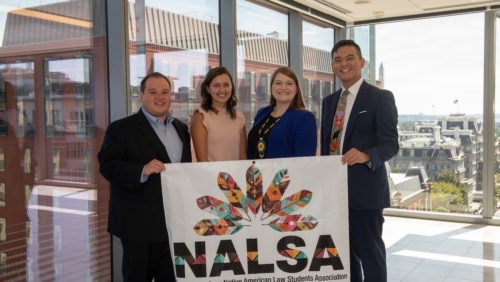Georgetown Law’s Native American Law Students Association Explores How to Expand Tribal Sovereignty
October 8, 2019

Michael Fisher (L'20), president of Georgetown Law's Native American Law Students' Association; Kayla Gebeck (L'20), NALSA vice president; Kelbie Kennedy, policy counsel for the National Congress of American Indians; and Emery Real Bird, financial management policy specialist at the Native American Finance Officers Association at Holland & Knight on September 20.
Georgetown Law’s Native American Law Students Association (NALSA) partnered with the law firm Holland & Knight on Friday, September 20, hosting a Policy & Pizza series on efforts to expand tribal sovereignty in the 116th Congress.
Mike Fisher (L’20), president of NALSA, and Kayla Gebeck (L’20), vice president, welcomed Kelbie Kennedy and Emery Real Bird to the D.C. office, where Gebeck also serves as the senior public affairs adviser. Kennedy is policy counsel for the National Congress of American Indians, and Real Bird is the financial management policy specialist at the Native American Finance Officers Association.
Georgetown students, congressional staffers, and advocates learned about efforts on a broad range of issues pertinent to Indian Country including homeland security, disaster and emergency response, border crossings and financial sovereignty.
“The group was intrigued and also surprised to hear of the wide array of efforts tribal officials make in order to secure tribal homelands and respond to natural disasters all while protecting Indians and non-Indians alike, with resources extremely disproportionate to those afforded to states and territories across the United States,” said Fisher, who noted that the room was full. “Ms. Kennedy spoke of the importance of cyber security in Indian Country and how tribes are taking steps to prevent their information from being subject to data breaches with few federal resources at their disposal.”
Kennedy also discussed issues tribes face on the southern, northern, and Alaskan borders in accessing their ancestral lands for religious and cultural purposes. She spoke of the Jay Treaty rights utilized by northern tribes to cross into their territories in Canada as well as the difficulties that tribal members from southern tribes face in crossing the United States and Mexico border to visit their families and for ceremonial purposes.
Real Bird emphasized the problems arising from the Tax Cuts Act of 2017, which changed the “Kiddie Tax” in ways harmful to Native American children, young adults and families. The tax, meant to prevent parents from avoiding paying taxes by putting property in their children’s names, inadvertently damages the per capita income that tribes distribute to individual members from their government income. Real Bird also focused on the importance of developing affordable housing for Native American communities, as well as general tax exemptions for businesses on tribal land.
Georgetown NALSA is eager to build on their momentum by hosting additional events on campus on important issues facing Indian Country. “We were excited to bring policy experts and law students together for this discussion,” Fisher said. “NALSA has a responsibility to ensure that the broader Georgetown Law community understands tribal issues and how decisions made in D.C. impact Indian Country. Events like this allow us to dive into the policy, engage potential allies, and forge lasting relationships with [people who] can advocate for tribes throughout their careers.”